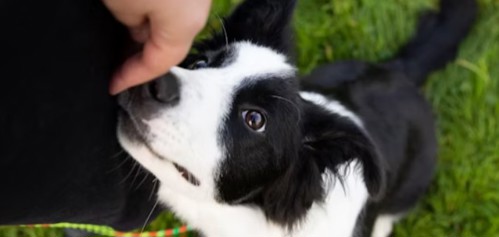
Vaccinating your dog is a great way to keep them safe from certain significant infectious diseases. Most dogs should be vaccinated when they’re puppies and many continue to receive boosters throughout their lifetime. Whether you’re a breeder or an owner, it’s important that you know which vaccinations are recommended, when your puppy should have their injections and how to keep your dog safe.
Why do dogs need to be vaccinated?
Vaccinating your dog can protect them from important infectious diseases that can be harmful or kill them. These diseases used to circulate in the dog population, but widespread vaccination programmes now provide a significant degree of protection to dogs that have been immunised and those that haven’t. Puppies are usually more vulnerable to these illnesses, so it’s important that your dog is vaccinated at a young age. Over time, your dog’s immunity to these diseases can fade. To continue to keep them safe, your dog may need to have further booster vaccinations to help maintain their immunity.
When should a puppy be vaccinated?
Most dogs receive their first set of vaccinations at around 8 weeks old, but your vet will be able to recommend what age is best, which may depend on whether their mum was fully vaccinated. Puppies are often given their first jabs while they’re still with their breeder and receive their second dose while they’re with their new owner.
Breeders should give any vaccination certificates to the new owner. Having these documents gives owners a record of what injections the puppy has had and when then the second course of vaccinations is due. When a new owner takes their puppy to the vet for the first time, it’s important that they discuss vaccination and bring along any vaccination certificates that they may have been given by the breeder.
The best lifetime dog insurance
Protect your dog with the UK's Number 1 pet insurer, with up to £25,000 cover for vet fees.
What vaccines do dogs need?
The four main vaccinations all puppies should receive are:
- Canine distemper – a highly infectious disease that is often fatal
- Hepatitis – a liver disease that can cause sudden death in puppies
- Parvovirus – a viral disease that causes vomiting, bloody diarrhoea and can be fatal
- Leptospirosis – two strains; both cause acute illness and attack the liver and/or kidney
Dogs can also be vaccinated against kennel cough and rabies, but these are not usually part of the standard vaccinations given. Your vet may recommend a kennel cough vaccine if your dog is going into kennels, is likely to mix with lots of other dogs, or if they have a weakened immune system. Rabies vaccinations may only be needed if you take your dog abroad.
How much are dog vaccinations?
In the UK, a puppy’s first vaccinations are usually between £40 and £70, but the cost may also depend on the vet you use and the area you live in.
A dog’s annual booster vaccinations often cost less than their first round of immunisations, usually around £50. Some vets may be able to offer your dog a booster vaccination and worming treatment at the same time, which saves the cost of having them done individually.
Keeping a record
Once a puppy is vaccinated, your vet will give you a vaccination certificate that gives a record of exactly when the puppy was vaccinated and which products were used. Make sure to keep this safe, as it may be needed if the dog stays at boarding kennels, goes to dog-training classes, or if they’re taken abroad. If you change vets, they may recommend a slightly different regime of vaccinations, and it will be useful to see what vaccination your puppy has had in the past.
How long after the second vaccine can dogs go out?
Once your dog has received their vaccinations, it takes a while until they reach maximum immunity. Until then, there is still a risk that they could become infected. In general, puppies should wait for around two weeks after they have had their second vaccination before they can go out. Your vet will be able to give you advice that’s tailored to you and your puppy and will be able to recommend when is best to take them out.
Can I walk my dog after vaccination?
Your puppy could still be at risk of catching some infectious diseases until they’ve had both sets of initial vaccinations. Instead of walking your puppy, it’s usually better to limit exercise to your garden or go to areas that are unlikely to be visited by other dogs. Alternatively, take your puppy to other safe environments where there is minimal risk. Visiting other people’s gardens, where your puppy can mix with other dogs that have been vaccinated, can help with their socialisation.
Can my puppy meet other dogs before they’re vaccinated?
If your puppy is not fully vaccinated, you should not let them come into contact with:
- Unvaccinated dogs
- Dogs you don’t know
- Areas that unvaccinated dogs could have visited
- Farms, areas by freshwater (rivers, lakes etc.) and any areas known to have a rodent infestation due to the risk of leptospirosis
Meeting these dogs, or visiting these areas could put your puppy at risk of being infected.
Although you need to keep them safe, puppies are most receptive to new environments and situations while they are still young. Just keeping them confined to your house and garden may be counterproductive. During these important first weeks at home, you could take your puppy out to different places in your arms, or use the car to get them used to different situations and noises, as well as letting them meet new people.
Can my puppy meet other dogs after their first vaccination?
Your puppy should, if possible, meet other dogs as soon as possible, but it’s vital that dogs that your puppy meets are up to date on their vaccinations. If your puppy meets an unvaccinated dog, or a dog that has reduced immunity to certain conditions, then they could infect your puppy. Meeting other dogs is an essential part of helping your puppy to fully develop and it helps them get used to other dogs.
When can I take my puppy to training classes?
You can start attending puppy training classes as soon as your puppy’s vaccinations are complete, but how early you can attend may vary from class to class. Most owners find it extremely useful to go to training classes to help their puppy get used to other dogs and people.
How often do dogs need vaccines?
Your puppy should have a high level of immunity a few weeks after they’ve completed their second round of vaccinations. Over time their immunity can fade. Many vets recommend annual boosters to keep your dog’s immunity as high as possible (and in accordance with the proper use of licenced vaccines). Your dog’s immunity may last for longer than a year, but having it boosted annually ensures that it's up to date and is easier to remember. Some owners prefer to check their dog’s levels of immunity before giving them a vaccine. A blood test, known as a titre test, can check a dog’s antibody levels, letting their owner know whether their dog needs a booster vaccination. Always speak to your vet for advice about the best way to maintain your dog’s levels of immunity.
What is titre testing?
A titre test is a type of blood test that can be used to check if your dog has antibodies to a disease, and to what degree. Antibodies are made when a virus or a bacterium triggers a response from the immune system. This could be from natural exposure or from a vaccination. Since a titre test can check for immunity, it has been suggested that it can be used to decide if a booster vaccination is needed, rather than giving annual vaccinations regardless of the level of immunity. Talk to your vet about how titre testing works and if it is something that they would recommend.
Is it illegal to not vaccinate your dog?
It is not a legal requirement to vaccinate your dogs. However, most owners vaccinate their dogs to protect them against infectious diseases and also to provide herd immunity to dogs that may be more vulnerable to these illnesses. It’s worth knowing that many doggy day care facilities or boarding kennels may need proof of vaccination before they consider looking after your dog.
Find a vet near you
If you're looking for a vet practice near you, why not visit the Royal College of Veterinary Surgeons' Find a vet page.
Find a dog trainer or behaviourist
Our online register helps you find accredited dog training instructors and canine behaviourists who have proven specialist knowledge, skills and experience.Think your dog may be affected?
If you're worried about your dog's health, always contact your vet immediately!
We are not a veterinary organisation and so we can't give veterinary advice, but if you're worried about any of the issues raised in this article, please contact your local vet practice for further information

